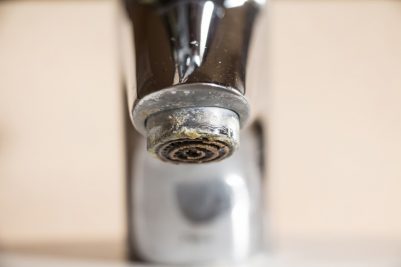What does “soft water” and “hard water” really mean?
 If you’re like most people, you don’t get into too many conversations about water. And, if you do, it usually focuses on the basic aspects – like its source and its temperature. But there are other aspects of water.
If you’re like most people, you don’t get into too many conversations about water. And, if you do, it usually focuses on the basic aspects – like its source and its temperature. But there are other aspects of water.
For instance, are you familiar with soft water? Do you know what it means? And, taken one step further, do you know what it’s opposite – hard water – really means? You have probably heard someone talking about their water in terms of it being hard or soft but, even then, it’s usually just in passing. But the meanings of both types of water – and their differences are relevant and pertinent to your health, plumbing, and the quality of cleaning you do in your home.
Soft and hard water share differences; all of which as to with chemistry.
The Issues with Hard Water
For example, hard water has a large number of minerals that are dissolved. These minerals range from magnesium and lime to calcium and chalk. Basically, as water travels through sunstones like rocks, it accumulates these solids that have dissolved. If this amount is excessive the water becomes categorized as hard water.
To be more technical, from 17 mg up to 60 mg per liter is the level that would qualify as slightly hard water. There is a category called moderate hard water which is for water that – per liter – has 60 -120 mg with hard water (with no qualification) comes in at a per liter range of 120-180 mg.
Water can exceed the hard water ceiling of 180 mg and be given the classification of very hard water. This is the level of hard water that will prompt problems in your home and to your family. This water will affect your appliances, dishes, laundry, and plumbing while also being tough on your skin.
But before you get too alarmed, get comfort in knowing that overall hard water isn’t a risk to your health. And, it possesses some beneficial features due to the robust mineral content. Possibly toxic metal ions such as lead, and copper can have their solubility reduced by hard water. But don’t dismiss the fact that hard water doe damage containers and pipes.
And, if you wash your dishes with hard water, you will have spots; just as you will get soap scum in the tub and shower when taking showers with hard water. Another domestic inconvenience of hard water is that even after you have laundered your clothes, they still may be dull or dingy. In effect, the sediments of hard water cause issues throughout the home.
Softening Water
At this point, you may see how important it is to have soft water in your home. The good news is that is can be softened through a process called ion exchange. This involves removing the minerals for your water through an exchange of a positively charged ion for sodium ions. There are some methods homeowners can do themselves. For instance, you can remove the buildup of scale caused by hard water with a homemade cleaner or use a squeegee for removing the water that is sitting after you take a bath.
We provide Water Well Drilling Services in the following Michigan Counties:
